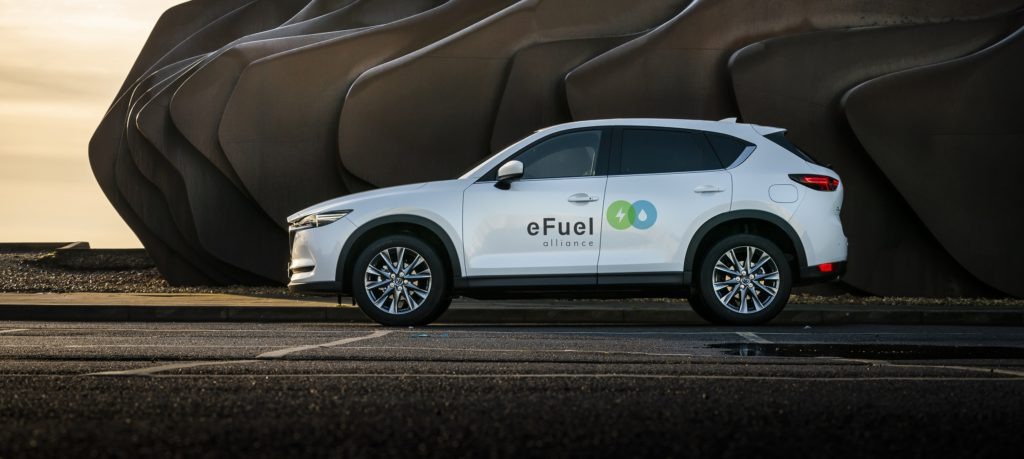E-fuels gain awareness as Mazda joins alliance
08 February 2021

08 February 2021
Mazda has joined the eFuel Alliance in order to establish an alternative to electrification technology.
The alliance brings together organisations and other interested parties that support the establishment and promotion of CO2-neutral fuels and hydrogen as a credible contributor to reducing emissions in the transport sector. It is an example of an organisation looking to other methods for a zero-carbon future.
Mazda has an electrification strategy in place, with a goal of all vehicles using batteries by 2030. There are varying targets for banning new internal combustion engine (ICE) and hybrid vehicles across Europe. Even with these changes in place, millions of older vehicles will continue to be on roads for decades to come.
E-fuels are synthetic and manufactured using renewable energy. They blend CO2 and hydrogen, making them a viable and environmentally friendly alternative to traditional fossil fuels. They are also known as ′drop-in’ fuels as they can be used with conventional ICE units.
A multi-solution approach is needed, allowing those older vehicles to reduce their contribution to harmful emissions. Establishing zero-carbon e-fuels could also help the logistics market, where time-critical deliveries and long-distance journeys do not suit current electrification technologies.
Continuing efforts
Mazda has been committed to developing cars and powertrains that meet both customer and environmental needs. Its SkyActiv-X engine is one of the most efficient petrol units on the market. The carmaker has partnered with Toyota and Denso to develop its hybrid and electric models.
′As an industry, we must reduce emissions as much as possible. And to do this we must not ignore any of the available routes at our disposal,’ said Wojciech Halarewicz, vice president communications and public affairs at Mazda Motor Europe. ′Greenhouse gas emissions and climate change are, by nature, a global and complex issue requiring an integrated approach. All sectors and industries must play their part and, above all, they must have the opportunity to share any positive options to achieving the climate goals.
′We believe that with the necessary investment, CO2-neutral e-fuels and hydrogen will make a credible and real contribution to emissions reduction – not only for newly registered cars but for the current fleet. This would open up a second and faster route to achieving climate neutrality in transport, hand-in-hand with continued electrification.’
EU shift
The European Union will review its regulations on CO2 standards for cars and vans later this year. By joining the eFuel Alliance, Mazda will be able to push for the recognition of the technology and ensure that the new legislation enables both battery-electric vehicles (BEVs) and those running on the synthetic fuels to contribute to carmakers’ emission-reduction efforts.
′Supporting and driving the understanding of climate protection policies that ensure fair competition among different technologies is the key goal of the eFuel Alliance,’ said Ole von Beust, managing director of the eFuel Alliance. ′The next two years will be decisive, as the European Commission will revise the main climate-policy regulations. Bringing together interested groups and organisations across all sectors involved will be crucial. That’s why we look forward to Mazda, with their long history in automotive innovation, being a strong partner in the eFuel Alliance.’
Increased awareness
The use of e-fuels is also being investigated by Formula 1, as the sport looks towards a zero-carbon future. Working with its engine manufacturers, organisers hope to develop the technology and prove its worth, as it did with hybrid drivetrains in 2014.
′Formula 1 didn’t invent the hybrid, but Formula 1 showed what a hybrid could be and it moved people’s perceptions of what a hybrid is capable of,’ commented chief technical officer Pat Symonds in 2019. ′I think we can do the same with new fuel technology and hopefully demonstrate that another viable alternative energy source is possible.’
Porsche is also working on establishing e-fuels. ′This technology is particularly important because the combustion engine will continue to dominate the automotive world for many years to come,’ said Michael Steiner, member of the executive board, research and development. ′If you want to operate the existing fleet in a sustainable manner, e-fuels are a fundamental component.’